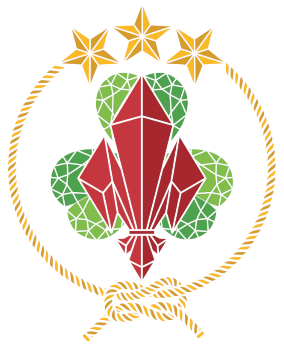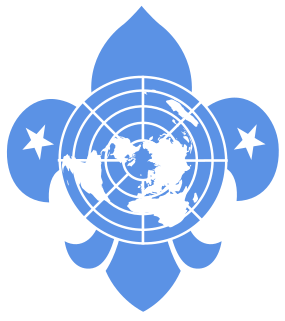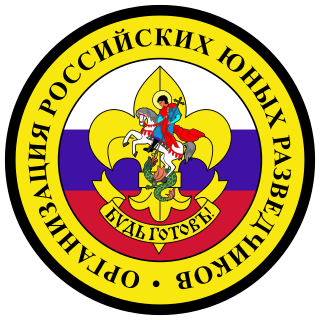
The World Organization of the Scout Movement is the largest international Scouting organization. WOSM has 171 members. These members are recognized national Scout organizations, which collectively have over 50 million participants. WOSM was established in 1922, and has its operational headquarters at Kuala Lumpur, Malaysia and its legal seat in Geneva, Switzerland. It is the counterpart of the World Association of Girl Guides and Girl Scouts (WAGGGS).

Latvijas Skautu un Gaidu Centrālā Organizācija is the primary national Scouting and Guiding organisation of Latvia and a member of both the World Association of Girl Guides and Girl Scouts and the World Organization of the Scout Movement. The organization had 759 members as of 2011.

The Afghanistan Scout Association was officially founded in 1931 in Afghanistan by a royal decree. The site of Robert Baden-Powell's second posting in 1880, Afghanistan was a member of the World Organization of the Scout Movement from 1932 until the Afghan government dissolved the Scout Association in 1947. Afghan Scouting was formed again from 1964 to 1978 and recognized by the World Organization of the Scout Movement.

Magyar Cserkészszövetség, the primary national Scouting organization of Hungary, was founded in 1912, and became a member of the World Organization of the Scout Movement in 1922 and again after the rebirth of Scouting in the country in 1990. The coeducational Magyar Cserkészszövetség had 8,145 members in 2011.

The Verband Christlicher Pfadfinderinnen und Pfadfinder is a German Protestant coed Scouting and Guiding association. According to the VCP, the organization has about 47,000 members.

The Scout movement in Germany consists of about 150 different associations and federations with about 260,000 Scouts and Guides.

The Scout movement in Belarus consists of an unknown number of independent organizations. There are at least five nationwide associations as well as some regional associations. In addition, there were at one time Scouts-in-Exile in metropolitan areas of the United States, and there are presently international Scout units in Belarus.

World Thinking Day, formerly Thinking Day, is celebrated annually on 22 February by all Girl Guides and boy Scouts. It is also celebrated by Scout and Guide organizations and some boy-oriented associations around the world. It is a day when they think about their "sisters" in all the countries of the world, the meaning of Guiding, and its global impact.

The Boy Scouts of the United Nations existed from 1945 through perhaps the early 1980s as the Scouting association serving the families of diplomats and staff of the United Nations, active in both Geneva and at Parkway Village in New York. The organization sponsored groups in India, Lebanon and Cyprus and had ties to the International Boy Scouts of the Canal Zone.

Külföldi Magyar Cserkészszövetség is a Scouts-in-Exile organization created for youth of Hungarian descent. Scouting makes it possible for the young men and women to learn more about their Hungarian heritage, language and culture. The organization is dedicated to carrying out its obligations at four levels: God, their adopted countries, their fellow man and the Hungarian nation. The Boy Scout and Girl Scout units meet in conjunction with Hungarian weekend schools, which in many instances they also operate.

Piet J. Kroonenberg was a Scouting historian and was the historical consultant to the European Scout Committee. He had written books and articles about Scouting during World War II and post-War Scouting in Central and Eastern Europe.

Colonel Oleg Ivanovich Pantyukhov was the founder of Russian Scouting.

The Organization of Russian Young Pathfinders is one of the two large Russian Scouting in Exile movements. This organization has historically drawn the conservative side of the spectrum of Russians in exile.

The National Organization of Russian Scouts is one of the two large Russian Scouting in Exile movements. This organization has historically drawn the liberal side of the spectrum of Russians in exile. In 2009 NORS celebrated the centenary Jubilee of Russian Scouting.

The Scout and Guide movement in the Czech Republic is served by
The Scout and Guide movement in Slovakia is served by
The Scout and Guide movement in Armenia is served by
Scouting has been active in displaced persons camps and in the lives of refugees since World War I. During and after World War II, until the early 1950s, Scouting and Guiding flourished in these camps. These Scout and Girl Guide groups often provided postal delivery and other basic services in displaced persons camps. This working system was duplicated dozens of times around the world. In the present, Scouting and Guiding once again provide services and relief in camps throughout war-torn Africa.

The Deutscher Pfadfinderbund in Namibia is a small Scouting association open mainly to boys and girls of German descent in Namibia.
The International Scouter Association was founded during a Scout conference in March 1947 in Mittenwald. The founders were German Scouts and Scouts-in-exile. The seat was in Munich.
















